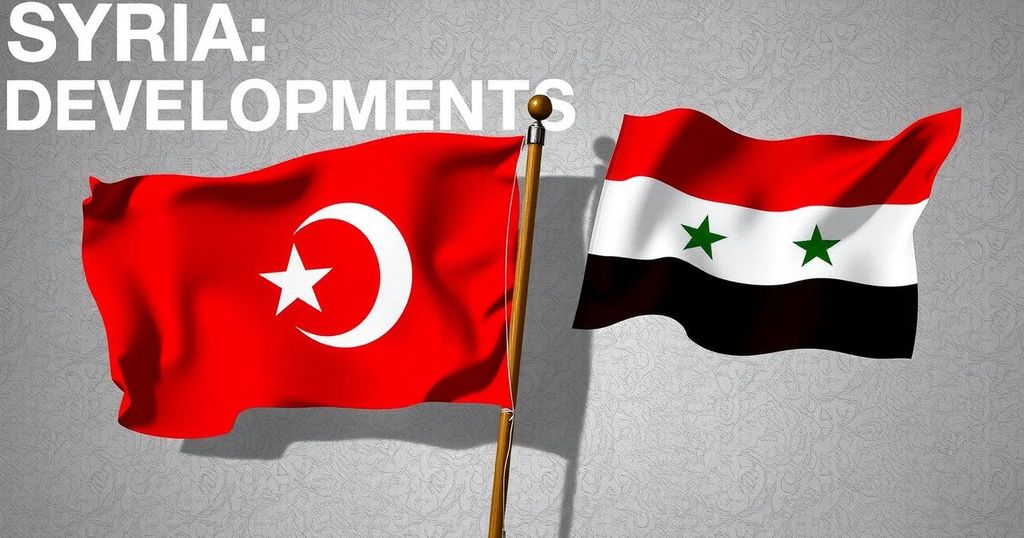World news
AHMED AL - SHARAA, ANKARA, ASIA, ASSAD, BASHAR AL - ASSAD, DONALD TRUMP, EUROPE/ASIA, FIGHTER JETS, HAY ' AT TAHRIR AL - SHAM, HEZBOLLAH, IDLIB, ISRAEL-HAMAS CONFLICT, ME, MIDDLE EAST, MIDDLE EAST AFFAIRS, NATIONAL COALITION FOR SYRIAN REVOLUTIONARY AND OPPOSITION FORCES, NORTH AMERICA, PALESTINE, RUSSIA, SYRIA, SYRIAN, SYRIAN CONFLICT, TURKEY, UNITED STATES, WAR
Marcus Chen
0 Comments
Turkey’s Emerging Role in Shaping Post-Assad Syria
Turkey has rapidly shifted its strategy in Syria following the surprising downfall of Bashar al-Assad’s government, launching extensive military operations that have led to significant territorial gains. Turkey is focused on establishing unity among opposition forces, promoting inclusive governance, and addressing the return of millions of refugees, while navigating tensions with Kurdish forces controlling key resources. Reconstruction of Syria remains a pivotal goal, with Turkish leadership expected to play a critical role in coordinating these efforts.
Ankara’s strategic maneuvers in Syria have undergone a rapid transformation following the downfall of Bashar al-Assad’s regime, which occurred unexpectedly swiftly. Turkish officials had perceived the fall of Assad as inevitable although they did not foresee the swift capture of major territories, notably Aleppo. The Turkish government initially authorized a limited scale assault aimed at aiding Syrian opposition forces against Assad, primarily to alleviate the pressure on civilians resulting from relentless strikes by government forces in Idlib, which had led to a surge of displaced individuals towards Turkey’s border.
With Syria’s military almost disorganized, and geopolitical competitors like Russia preoccupied with the conflict in Ukraine, Turkey seized the moment to significantly advance its military objectives within Syria. A once-restricted operation escalated rapidly into a comprehensive campaign that saw Turkish-backed forces establish dominance in several cities within eleven days. This transformation has granted Turkey unparalleled sway in shaping the future of Syria.
Following these developments, Turkish authorities have advocated for productive dialogues between the Syrian government and opposition factions while maintaining the importance of the nation’s institutional framework. The leader of Hay’at Tahrir al-Sham, Ahmed al-Sharaa, also known as Abu Mohammad al-Jolani, has sought to preserve governmental structures, extending overtures to minority groups, including Christians, in an attempt to foster an inclusive governance approach.
Khaled Khoja, a prominent political figure, asserts that Turkey’s involvement has been instrumental throughout the operation, facilitating strategic coordination with Russia and helping to translate concepts of governance and reconciliation into practice. President Recep Tayyip Erdogan’s remarks anticipating “good news” for Turkey’s security reflect Ankara’s proactive stance amidst evolving scenarios in Syria.
Turkey aims to facilitate unity among Syria’s diverse opposition militaries while laying the groundwork for a transitional government that encapsulates all political factions. Regional expert Can Acun highlights Turkey’s previous successes in establishing local governance and economies in northern Syria and anticipates utilizing this experience in future transitional frameworks.
A significant factor in Turkey’s objectives includes reconciliation with the Kurdish-led Syrian Democratic Forces (SDF), which control essential resources and territories. Observers speculate potential negotiations between HTS and the SDF to access these resources, especially concerning fuel supplies from oil fields in Deir Ezzor. Furthermore, Turkish administration views the SDF as a terrorist entity due to their affiliation with the PKK and may consider military options to counter their influence in strategically vital regions.
An additional critical aspect of Turkey’s approach involves managing the return of over three million Syrian refugees, many of whom originate from Aleppo. As local industries revive, economic corridors connecting Turkey and Syria are anticipated to facilitate this return. However, a gradual reintegration process hinging on security, infrastructure rehabilitation, and socio-economic stability is essential for a successful repatriation.
Extensive reconstruction efforts post-conflict are inevitable, with estimates indicating a staggering need for the rebuilding of infrastructure and homes, projected to be around $360 billion. The Organisation of Islamic Cooperation and Gulf nations are expected to play crucial roles in financing these efforts, with Turkey likely spearheading coordination efforts to oversee reconstruction and humanitarian initiatives aimed at fostering stability in the region.
The regional dynamics concerning the Syrian conflict heavily involve Turkish interests, particularly in light of the ongoing struggle for power and governance in Syria. After years of civil war, the situation has become increasingly fluid, with various factions vying for control. Turkey has maintained a position of support for opposition groups opposing Assad, while simultaneously seeking to prevent Kurdish entities, particularly the SDF, from establishing autonomy in northern Syria. Turkey’s military operations reflect its strategy to influence both the course of the conflict and the eventual reconstruction of Syria post-Assad, as it attempts to safeguard its southern borders and address refugee concerns.
In summary, Turkey’s rapid response to the changing landscape in Syria has enabled it to emerge as a key player in shaping the future governance of the region. With strategic military operations yielding significant territorial gains, Ankara’s efforts to foster opposition unity while courting international cooperation—including with Russia—demonstrate its commitment to establishing influence in post-Assad Syria. Concurrently, the return of refugees and anticipated reconstruction efforts will likely hinge on Turkey’s ability to maintain stability and safeguard essential resources.
Original Source: www.middleeasteye.net




Post Comment